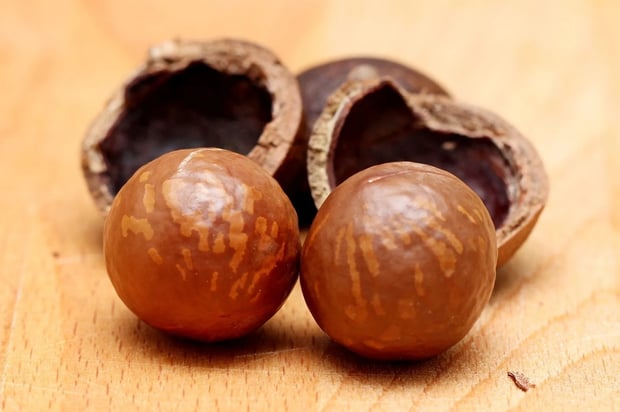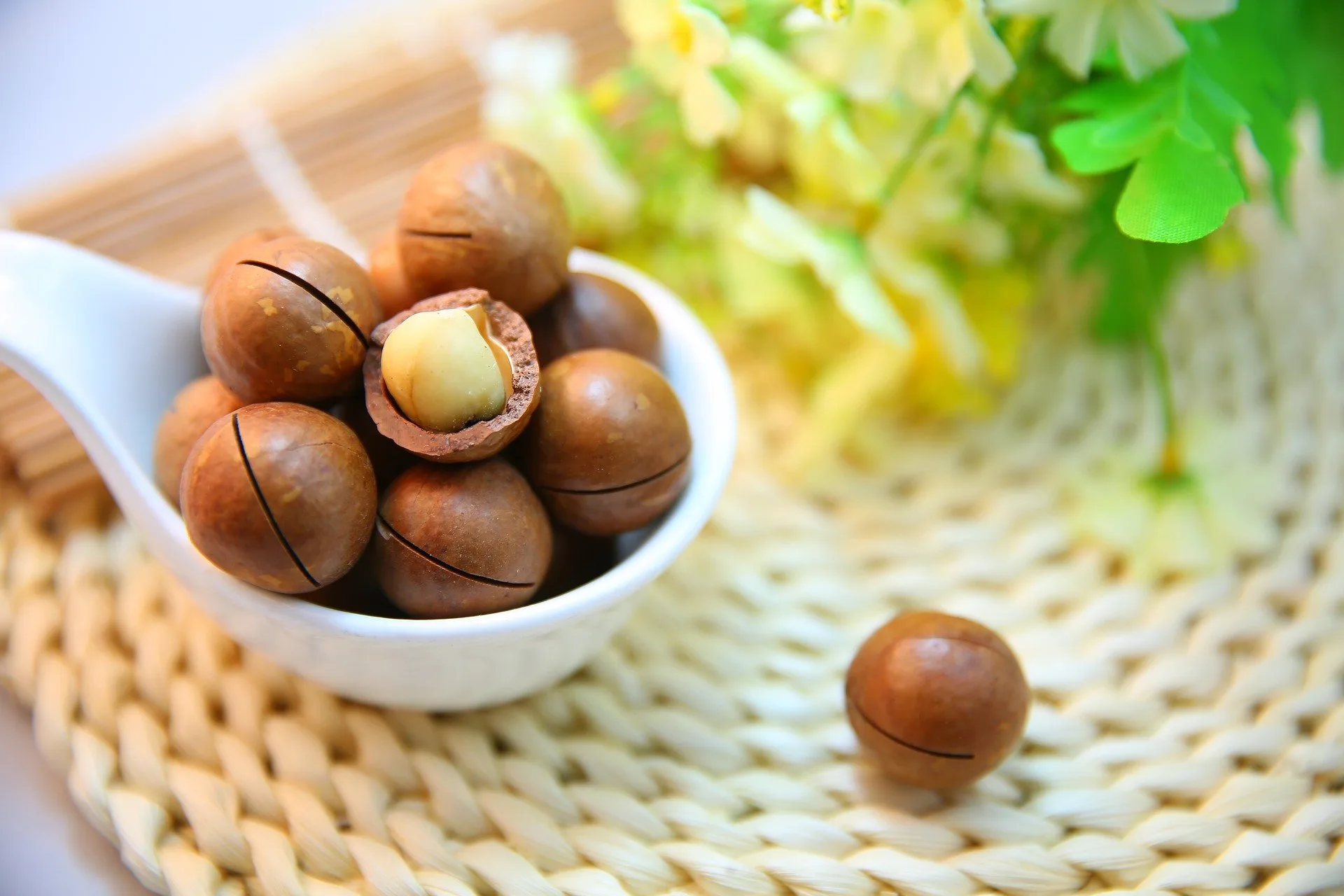When it comes to Macadamia nuts, the industry is facing steady growth. According to new research, it appears that, in conjunction with consumers adopting a more plant-based form of eating, as well as the fact that macadamia nuts can grow in both warm and tropical climates, there is no stopping the booming industry. What’s more, the same research has found that the industrial growth of macadamia nuts may serve to play a vital role with regard to the social as well as economic development in countries such as South Africa, Kenya, as well as Malawi. That said, one has to wonder what exactly has consumers so interested and invested in these hard-shelled nuts? The answer is quite simple: they are incredibly healthy.
What Are Macadamia Nuts?
Fruits from the macadamia tree, which can reach as much as 40 feet, macadamia nuts are hard and woody nuts, containing one or two seeds, are native to both Australia and Hawaii. They are commonly referred to as Queensland nuts, bush nuts, and even Hawaii nuts.
With regard to its nutritional information, macadamia nuts are low in both carbs and sugar, and they also contain fat, protein, as well as fiber and iron. Additionally, the nuts are also rich in magnesium, copper as well as monounsaturated fats – which are perfect for heart health. If that’s not enough, macadamia nuts are also high in antioxidants, which we know help to prevent the development of diseases, as well as a form of vitamin E, tocotrienols, which also helps to protect the body from chronic diseases.
With such a rich nutritional value, it’s no wonder that macadamia nuts have been linked to so many health benefits.
Benefits of Macadamia Nuts
1. A healthier heart
Heart-related diseases continue to be the leading cause of mortality worldwide, so it made it advisable to start snacking on more macadamia nuts.
According to a study published in the Journal of Nutrition, a diet that’s high in macadamia nuts was found to reduce the total cholesterol levels in both men and women. High levels of cholesterol can increase the risk of heart disease as excess cholesterol can block blood flow to the heart.
Additionally, macadamia nuts are also rich in monounsaturated fatty acids which, according to the American Heart Association, also helps to reduce levels of bad cholesterol in the body (1).
What’s more, findings published in the journal Functional Foods in Health and Disease also noted the cholesterol-lowering effects of tocotrienols – a form of vitamin E found in macadamia nuts.
2. Lowers risk of metabolic syndrome
Metabolic syndrome refers to a group of factors that can increase the risk of diabetes, stroke, as well as heart disease. The most common metabolic syndromes are insulin resistance, obesity, high blood pressure and blood sugar, low levels of HDL (good) cholesterol as well as high levels of LDL (bad cholesterol).
As mentioned, macadamia nuts are incredibly high in monounsaturated fats and this may help reduce the risk of metabolic syndrome.
According to research published in the journal Nutrients, monounsaturated fats can help to lower the risk of metabolic syndrome by lowering blood pressure as well as regulating the levels of cholesterol and triglyceride in the body.
3. Help with weight management
Yes, macadamia nuts are quite rich in calories yet if consumed in moderation, they may help you maintain your weight.
As mentioned, macadamia nuts contain protein as well as fiber and these two nutrients can help to regulate weight. This is because both protein and fiber both encourage feelings of satiety, and this then reduces hunger. If that’s not enough, findings published in the Clinical and Experimental Pharmacology and Physiology journal found that a group of Japanese women who had consumed bread daily with 10 grams of macadamia nuts experienced a loss of 0.9 pounds (0.4 kg) by the end of the study. Those who had consumed their bread with either coconut or butter remained at the same weight.
Additionally, an animal study found that obese mice that were fed large quantities of macadamia oil over a period of 12 weeks were found to have significantly fewer fat cells than those who were not given any oil.
 4. Improved brain health
4. Improved brain health
As mentioned, macadamia nuts contain high amounts of tocotrienols and these compounds have been linked to protecting brain health.
For one, research published in the Bosnian Journal of Basic Medical Sciences journal suggested that tocotrienols may help prevent the development of Alzheimer’s disease and Parkinson’s disease.
Aside from tocotrienols, macadamia nuts also contain oleic acid, which is classified as an omega-9 fatty acid. According to research, oleic acid is vital for brain health as it helps to reduce brain inflammation (2). Macadamia nuts also contain palmitoleic acid, which serves to protect the nerve cells in the brain, ensuring healthy brain function.
5. Stronger bones
Macadamia nuts are also rich in calcium, magnesium, manganese, as well as potassium – four minerals that help to optimize bone health.
For those who may not know, magnesium helps to prevent bone fractures as well as reduce the risk of bone disease osteoporosis. Lastly, both potassium and manganese help to reduce the loss of calcium from the bones.
Buying, eating, and storing macadamia nuts
Macadamia nuts are found all year round, so you can buy them any time the craving hits. You can find them at your local supermarket, or you can buy your macadamias online. That said, it’s important to only buy macadamias that are free of any additives, salt, or sweetness. It’s preferable to opt for raw macadamias but if you have no time to roast them yourself, then dry-roasted ones work well.
Macadamia nuts can also be grounded as well as sprinkled into soups as well as warm dishes. Additionally, you can also enjoy macadamias in the form of macadamia butter, or you can soak and ground them into a paste and use it as a base for your favorite homemade desserts. Since macadamias are high in calories, it’s best to only consume a serving (around 11 nuts) a day in place of other unhealthy snacks.
The nuts can be stored in an airtight container for at least five months. Additionally, they can also be refrigerated for up to one year.
References
Cappa, Marco & Bizzarri, Carla & Petroni, et al. (2011). A mixture of oleic, erucic and conjugated linoleic acids modulates cerebrospinal fluid inflammatory markers and improve somatosensorial evoked potential in X-linked adrenoleukodystrophy female carriers. Journal of Inherited metabolic Disease. 35. 899-907. 10.1007/s10545-011-9432-3.
Clifton, P. Metabolic Syndrome—Role of Dietary Fat Type and Quantity. Nutrients 2019, 11, 1438. https://www.mdpi.com/2072-6643/11/7/1438
Edson A. Lima, Loreana S. Silveira, Laureane N. Masi, et al., Macadamia Oil Supplementation Attenuates Inflammation and Adipocyte Hypertrophy in Obese Mice, Mediators of Inflammation, vol. 2014, Article ID 870634, 9 pages, 2014. https://doi.org/10.1155/2014/870634.
Frigolet, M. E., & Gutiérrez-Aguilar, R. (2017). The Role of the Novel Lipokine Palmitoleic Acid in Health and Disease. Advances in nutrition (Bethesda, Md.), 8(1), 173S–181S. doi:10.3945/an.115.011130
Griel, A & C, Yumei & Bagshaw, et al. (2008). A Macadamia Nut-Rich Diet Reduces Total and LDL-Cholesterol in Mildly Hypercholesterolemic Men and Women. The Journal of Nutrition. 138. 761-7. DOI: 10.1093/jn/138.4.761
Hiraoka-Y, Junko & Ikeda, Katsumi & Negishi, et al. (2005). Serum lipid effects of a monounsaturated (palmitoleic) fatty acid-rich diet based on macadamia nuts in healthy, young Japanese women. Clinical and experimental pharmacology & physiology. 31 Suppl 2. S37-8. 10.1111/j.1440-1681.2004.04121.x.
Kah, H & Y, J & W, et al. (2011). Effect of Mixed-Tocotrienols in Hypercholesterolemic Subjects. Functional Foods in Health and Disease. 1. https://www.functionalfoodscenter.net/files/43682631.pdf
Selvaraju TR, Khaza’ai H, Vidyadaran S, Abd Mutalib MS, Vasudevan R. The neuroprotective effects of tocotrienol rich fraction and alpha tocopherol against glutamate injury in astrocytes. Bosn J of Basic Med Sci [Internet]. 2014Nov.16 [cited 2019Nov.19];14(4):195-04. Available from: http://www.bjbms.org/ojs/index.php/bjbms/article/view/195
Veronese, N., Stubbs, B., Solmi, M., Noale, M., Vaona, A., Demurtas, J., & Maggi, S. (2017). Dietary magnesium intake and fracture risk: Data from a large prospective study. British Journal of Nutrition, 117(11), 1570-1576. doi:10.1017/S0007114517001350
https://agribook.co.za/blog/macadamias-vital-to-development-in-emerging-market/
https://www.who.int/news-room/fact-sheets/detail/the-top-10-causes-of-death
https://www.heart.org/en/healthy-living/healthy-eating/eat-smart/fats/monounsaturated-fats





